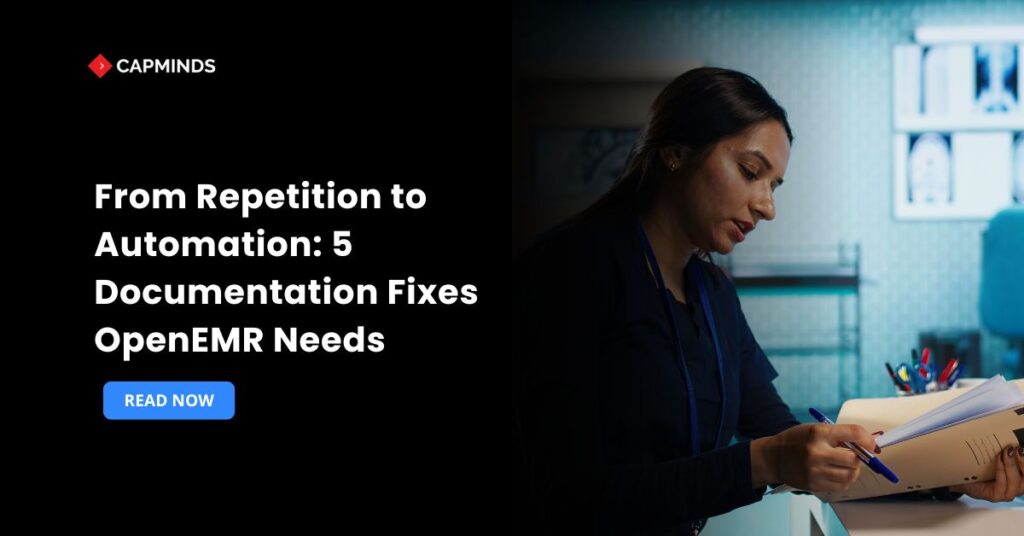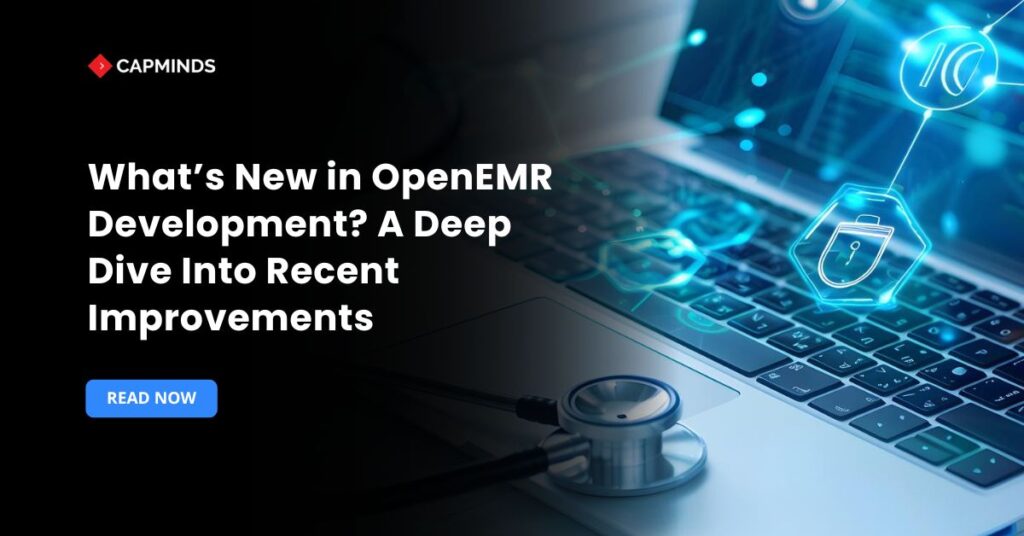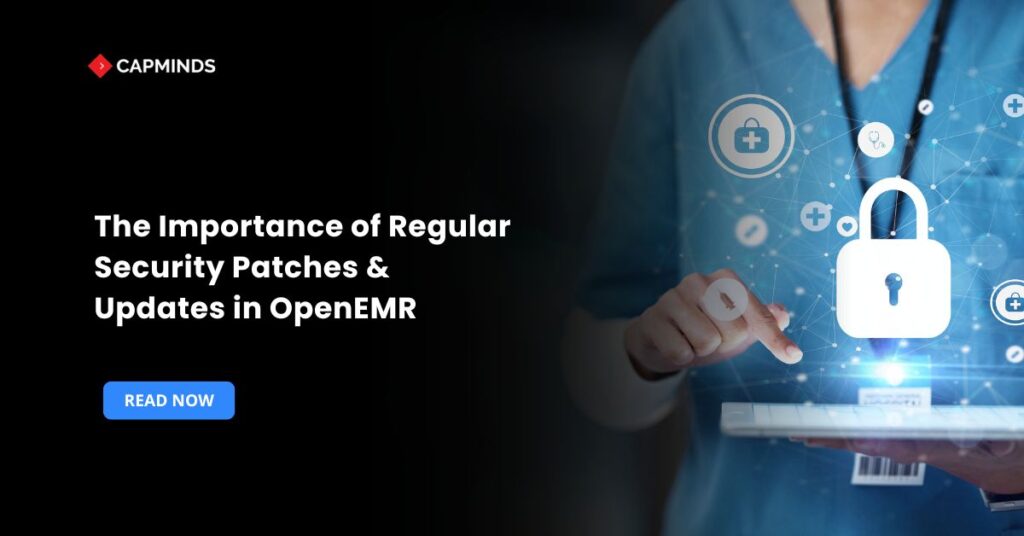OpenEmr for hospitals
Hospital OpenEMR implementation done
fast, compliant, and worry-free
From managing admissions & outpatient visits to integrating labs
and pharmacies - streamline every hospital workflow with
customizable, secure, and scalable OpenEMR solutions.












































No more workflow bottlenecks!
CapMinds empowers hospitals with a fully integrated OpenEMR platform that unifies departments, improves financial outcomes, and enhances patient safety.
Hospitals are dealing wth high claim denial rates, regulatory audits, and rising patient demands. Our OpenEMR/EHR services unify departments and enhance patient safety that streamlining large-scale operations, improving staff productivity, and protecting revenue.
How CapMinds Helps Hospitals with OpenEMR
0 %
0 %
0 M $ +
0 +
CapMinds OpenEMR Development Services
For Hospitals
Hospital OpenEMR Implementation & Rollout
- CapMinds delivers a smooth OpenEMR implementation designed for large-scale environments.
- We handle hospital OpenEMR data migration, set up secure infrastructure, and configure inpatient workflows with minimal downtime.
- Multi-department scheduling & role-based calendars
- Admission/Discharge/Transfer (ADT) workflows
- Provider credentialing & payer enrollment setup
- Cloud/on-premises high-availability architecture
- Secure patient & billing data migration
- Go-live support & hypercare transition
Enterprise OpenEMR Customization
- Every hospital needs a tailored solution.
- Our OpenEMR customization adapts to complex inpatient and outpatient requirements.
- We design an OpenEMR hospital workflow that cuts administrative time and improves care coordination.
- Inpatient & specialty-specific note templates
- Clinical decision support with alerts/reminders
- Multidisciplinary care plans & order sets
- Custom dashboards for leadership roles
- Bed management & patient census tracking
- Discharge summaries & follow-up protocols
Hospital EHR System Integration
- We connect OpenEMR with the wider hospital information system infrastructure.
- Our team manages hospital EHR system integration across labs, imaging, pharmacy, and ERP platforms to ensure seamless operations.
- HL7 v2 ADT, ORM, ORU channels (via Mirth Connect)
- DICOM imaging & PACS connectivity
- LIS interfaces (Quest, LabCorp, in-house labs)
- OpenEMR hospital pharmacy integration
- FHIR APIs for external partner connectivity
- Clearinghouse, CRM, ERP, and payer integration
OpenEMR Hospital Billing Integration
- Hospital billing demands precision.
- With OpenEMR hospital billing integration, we streamline claims, automate coding, and reduce denials.
- Our revenue cycle solutions improve first-pass approvals and provide transparent reporting.
- DRG, CPT, and ICD-10 coding support
- Real-time eligibility & benefits verification
- Multi-payer claim submission & ERA autoposting
- Denial prevention, appeals, and underpayment tracking
- Revenue dashboards & KPI packs
- Charge capture for inpatient & outpatient units
Patient Access & Engagement at Scale
- Hospitals thrive on patient trust and convenience.
- We enable multi-location hospital EMR systems with portals, telehealth, and scheduling tools that improve access while reducing staff workload.
- Enterprise patient portal with role-based logins
- Multi-department appointment booking & reminders
- Telehealth integration for outpatient & inpatient care
- Digital intake, e-consents, and pre-visit forms
- Multi-language portal support
- Payment processing & billing statement automation
Hospital OpenEMR Security & Compliance
- CapMinds ensures your deployment meets hospital OpenEMR HIPAA compliance setup and security standards.
- We align with ONC, TEFCA, and enterprise-grade best practices for a secure, compliant system.
- HIPAA & ONC Cures Update compliance
- Department-level audit trails & role-based access
- TEFCA/FHIR readiness for national exchange
- Staff identity management & MFA controls
- DEA-compliant EPCS workflows
- Data encryption, backups, and disaster recovery
Large-Scale EMR Deployment & Managed Services
- Running a hospital requires more than software—it demands stability.
- Our large-scale EMR deployment support includes monitoring, updates, and optimization to keep your system reliable and efficient.
- 24×7 proactive monitoring & incident response
- Regular version upgrades & regression testing
- Database & server performance optimization
- Ongoing staff training & onboarding refreshers
- Quarterly system health checks
- Dedicated hospital support manager
Who Do We Serve?
Advanced OpenEMR Service Capabilities We Support for Hospitals
Multi-Site Scheduling & Bed Management
Hospitals often struggle with juggling multiple sites and departments. With OpenEMR, you can coordinate scheduling and track bed availability in real time, easing patient flow.
Integrated Billing & CMS-Ready Claims
Claims and billing get complicated at scale. Our OpenEMR hospital billing integration supports CMS-ready submissions that cut denials and boost practice revenue.
Lab & Imaging System Connectivity
No more chasing reports between systems. With the hospital information system OpenEMR, lab and imaging data flow straight into the patient record for faster decisions.
Telehealth & Remote Patient Monitoring
Today’s hospitals need care to reach beyond four walls. Through inpatient OpenEMR configuration, we enable secure telehealth and remote monitoring without disrupting workflows.
Population Health Dashboards
Large hospitals depend on clear visibility. We set up dashboards that bring together clinical, operational, and financial data so you can track outcomes more easily than before.
FHIR/HL7 Interoperability
Health data shouldn’t live in silos. Using FHIR and HL7, we handle hospital OpenEMR data migration and integration, so your systems remain connected to each other.
Disaster Recovery & Cloud Hosting
Downtime can be tragic in a hospital. That’s why we provide secure cloud hosting, automatic backups, and disaster recovery to keep health records available at all times.
Custom Role-Based Access & Security
Access control can’t be one-size-fits-all. With hospital OpenEMR security compliance, permissions are role-based, so staff see exactly what they need—nothing more.
Optimize Your OpenEMR Workflows
Get a free OpenEMR assessment for your hospital— identify bottlenecks, save time, and prevent costly compliance gaps.
Why Use CapMinds OpenEMR Solutions for your hospital?
Case Study
Title – Modernizing Hospital Efficiency with OpenEMR Services
Challenge – A large regional hospital struggled with fragmented EHRs, frequent claim denials, and long patient wait times.
Solution – CapMinds implemented OpenEMR with integrated HL7 channels, enterprise scheduling, and revenue cycle automation.
Results – These improvements resulted in faster care delivery and better patient experience.
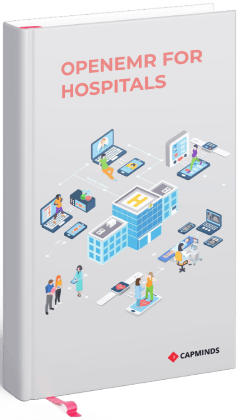
Specialty-Specific EHR Expertise You Can Trust
What Makes Us a Trusted OpenEMR Development Company
CapMinds is globally recognized for excellence in Healthcare IT security, regulatory compliance, responsive support, and service quality. Trusted by leading healthcare organizations, we uphold the highest standards to safeguard patient data, ensure uninterrupted operations & deliver solutions you can rely on.
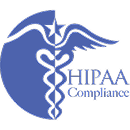
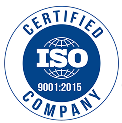





What Our Clients Say
Hear from healthcare leaders who’ve transformed their operations with our service & solution.
Let’s Transform Your Hospital with Large-Scale EMR Deployment Using OpenEMR
Consult with our experts and claim your hospital OpenEMR assessment today.
- 40% Reduction in Operational Bottlenecks
- 50% Faster Claims & Reimbursements
- 98% Clean Claim Accuracy
- 100% HIPAA-Compliant, ONC-Certified EHR
FAQ
1. What is OpenEMR implementation in hospitals?
Deploying and configuring OpenEMR for hospital use—covering infrastructure, security hardening, specialty templates, integrations (FHIR/HL7/C-CDA), data migration, testing, and go-live support.
3. Is OpenEMR suitable for large hospitals?
Yes, with the right architecture: load-balanced web nodes, database replication, centralized logging, HA/DR, and robust integration layers. Many sites run OpenEMR as a multi-location, multi-department system.
5. What are the costs of OpenEMR for hospitals?
The software is open source; costs come from infrastructure, implementation, integrations (FHIR/HL7/X12), data migration, security/ HIPAA controls, training, and ongoing managed support.
7. Can OpenEMR integrate with hospital billing?
Yes. Typical patterns include X12 837/835 with clearinghouses, real-time eligibility (270/271), coding assistance, charge capture, and denial management—wired through standard APIs and RCM workflows.
9. Can OpenEMR connect with lab systems?
Yes. HL7 v2 (ORM/ORU) and FHIR Orders/Observations are common, with LOINC mapping for results and interface engines (e.g., Mirth/NextGen Connect). Imaging ties in via DICOM/PACS viewers.
11. Does OpenEMR work with telehealth in hospitals?
Yes. You can embed HIPAA-ready video visits, pre-visit intake, e-prescribe, and device-based RPM feeds via APIs—so virtual care and inpatient workflows live in one record.
2. How do hospitals set up OpenEMR?
Assess workflows → provision infra (on-prem or cloud) → install and harden OpenEMR → configure departments, roles, and order sets → integrate labs/imaging/billing → migrate data → validate → train → staged go-live.
4. How long does OpenEMR implementation take?
Small units: ~4–8 weeks. Enterprise, multi-department rollouts with migrations and interfaces: ~3–6 months depending on integrations, training scope, and change management.
6. Does OpenEMR support multi-department use?
Yes. It supports multiple facilities, departments, provider schedules, order routing, and permission models; you can segment workflows for inpatient, outpatient, ED, and ancillary services.
8. Is OpenEMR HIPAA compliant for hospitals?
OpenEMR can be configured to support HIPAA compliance when deployed with proper safeguards: access controls, audit logs, encryption, BAAs, secure hosting, and documented policies/procedures.
10. How secure is OpenEMR for hospital data?
Security depends on deployment: TLS in transit, database encryption at rest, RBAC/least-privilege, MFA, IP allow-listing, audit trails, patch management, backups, and tested disaster recovery.
12. What are the challenges of hospital OpenEMR implementation?
Data quality in migrations, clinician adoption, workflow redesign, legacy interfaces, governance, and security hardening. A phased rollout with strong training and interface testing reduces risk.
